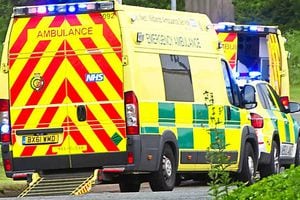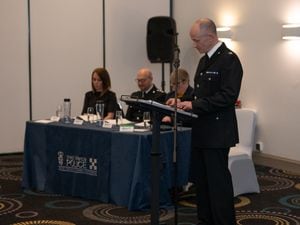Ambulance time targets are axed in Mid Wales
Targets for ambulance response times in Mid Wales will be dropped for all but the most life-threatening calls.

The Welsh Assembly has launched a one-year trial from October, where the performance by the Welsh Ambulance Service will be assessed instead by clinical outcomes.
The target of responding to 65 per cent of life-threatening calls within eight minutes will be reviewed.
Statistics released yesterday showed the service missed its target for responding to emergency calls in June.
An ambulance arrived on the scene within eight minutes for 61.4 per cent of "red" emergency calls throughout Wales – and just 54.5 per cent in Powys.
The new model will introduce three new categories of calls – red, amber and green – to replace the current system.
Red calls are immediately life-threatening cases, amber calls refer to those patients with conditions which may need treatment and care at the scene and fast transport to a healthcare facility, while green calls are non-serious. Call handlers will also have up to 120 seconds extra to ask important questions about a patient's symptoms, identify the nature of their condition and the type of response needed – this may be an advanced paramedic who can provide treatment at the scene and prevent the need for further hospital treatment or an ambulance crewed by paramedics to treat and stabilise a patient before taking them to hospital.Many people will be safely advised over the phone, helping to reserve ambulance resources for patients who need them.
Vaughan Gething, deputy health minister, said: "The demands placed on our emergency ambulance service are more complex than ever before and are growing year-on-year. It is clear if we are to meet these demands and ensure the best outcomes for patients, we need to transform the way in which we deliver emergency ambulance services.
"The new clinical response model, which we will pilot in Wales, has been designed by Wales' top ambulance service clinical leaders and is based on firm evidence. It is a move away from the system based solely on the eight-minute response time target, which was introduced 41-years ago, to one which measures how successful our ambulance clinicians are in ensuring they have the most positive impact on clinical outcomes and people's quality of life.
"I am confident these changes will improve patient experience. They will also make emergency ambulance services in Wales among the most progressive and transparent in the world.
Tracy Myhill, chief executive of the Welsh Ambulance Services NHS Trust, said: "Having a fast ambulance arrive at a patient's door does not necessarily translate to a better outcome. However, having the right type of vehicle arrive at a patient's door and timely transport to a treatment centre does."





